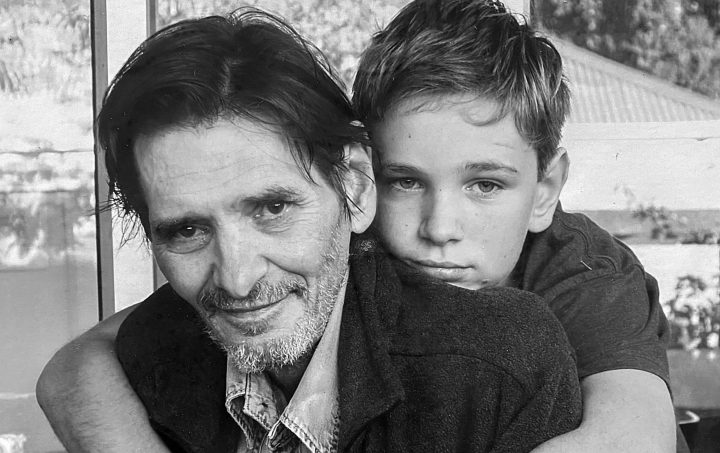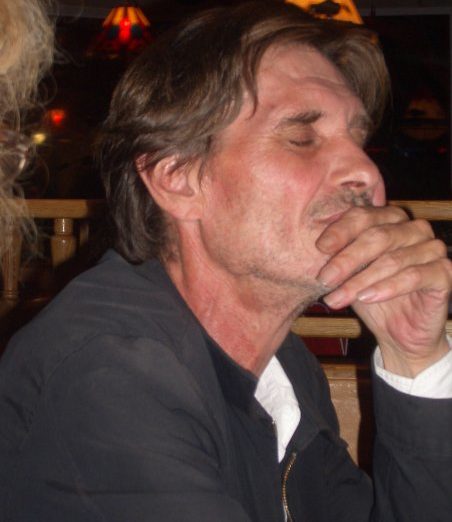OBITUARY
Ivor Powell: Dapper and dazzling Dadaist, brilliant art critic, super sleuth, sensitive Scorpion, formidable investigative reporter and generous mentor

A journalist and author remembers an inspirational figure.
Jonathan Ancer is a South African journalist, author, podcaster and media trainer.
One evening, fresh out of university and trying to find my feet in the world, I stumbled into a bar in Melville and struck up a conversation with a journalist. I can’t remember what we talked about — it was the early 1990s so it must have been politics — but I remember that at the end of the evening I decided to become a journalist like the one I’d been chatting to.
That journalist was Ivor Powell, one of the country’s foremost investigative reporters, who died on Wednesday 18 August, five days short of what would have been his 66th birthday. I hadn’t just met a crack reporter; I’d met a guru, whose interview with the condemned Vlakplaas death squad member Almond Nofomela in 1989 led to a chain of events that confirmed the existence of a state-sponsored third force.
Ivor, who was then in his mid-30s, was the archetype of a hard-drinking, battle-scarred, scoop-nabbing journalist. That was just one version of Ivor.
Artist John Nankin has another. The Ivor he met in the 1980s was a gentle soul who wrote smooth prose, was a celebrity in the underground art world, a philosopher, an eclectic thinker and an invaluable interlocutor.
“Ivor, at his core, was intellectually generous,” said Nankin.

Ivor Powell, one of the country’s foremost investigative reporters, who died on Wednesday, 18 August, five days short of what would have been his 66th birthday. (Photo: Facebook)
At that time Ivor was the chairperson of Arts Possession Collective, a group of artists of all persuasions who weren’t interested in making things that would decorate people’s homes, but wanted to make sense of the world. Their medium was performance theatre; art that probed, prodded and pricked.
“It was sheer chaos. It was brilliant,” said Nankin. “The early 1980s was a terrible time to be alive in Joburg and this was a release.”
Ivor wrote abstract, stripped-down impressionistic plays.
He had studied philosophy and art history and was lecturing everything from classical Greek sculpture to Dada and performance at Wits and Unisa.
“That period was formative for Ivor,” said journalist and art critic Sean O’Toole, who presented the paper “The Trickster: The Life and Hard Times of Ivor Powell” at a Rhodes University Department of Fine Art colloquium in 2011.
In 1985, Ivor reviewed an exhibition for the launch edition of the Weekly Mail, and soon left academia to become the paper’s art critic.
World-renowned artist Sue Williamson said Ivor earned a reputation as the most influential South African art critic of that period.
According to O’Toole, Ivor had a fluorescent career as an art journalist, and was just as weighty as any of the world’s greats, but, besides producing the insightful Ndebele — A People & Their Art, he never managed to make the jump into books that would bring that thinking into hard focus to a large audience.
Ivor wasn’t thrilled with being called an art critic and had told O’Toole that the self-importance of the designation never sat comfortably with him.
The South African art world was small and it was difficult for Ivor to find a space to operate in. He complained to Nankin that if he praised an artwork he was accused of promoting an artist and if he wrote something negative he was accused of thwarting someone’s career. He was also disenchanted with the commercialisation of art.
“He drifted into politics and investigations,” said Nankin. “It was then that the legend of him as a hard-living, hard-drinking maverick journo developed, but that wasn’t the Ivor of the ’80s.”
From the Melville bar in the 1990s to Cape Town 2009, which is where I met another version of Ivor. I looked up from my desk at Independent Newspapers to see a skinny figure slinking through the Cape Argus newsroom.
It was Ivor, who looked like the super-sleuth Columbo, which was appropriate because he’d been appointed the group’s head of investigations.
The drama in Ivor’s life in that 20-year interval between my encounter with him could fill the pages of an intriguing spy novel or three: conspiracies, assassination plots, underworld crime bosses and politicians’ double crosses.
The drama came to a head in May 2009 — almost immediately after Ivor began working at Independent Newspapers — when Blade Nzimande, the minister of higher education and a Jacob Zuma ally, told a rally that Ivor, “a professional information peddler”, had landed a job at the biggest newspaper group in South Africa.
“We must make it clear that they are employing somebody who is a threat to the security of the state,” he stated.
The reason that Ivor found himself in the middle of a political storm goes back to the early 2000s when he traded in his press card for a spook’s badge and became an investigator with the Directorate of Special Operations, the now defunct Scorpions. After then president Thabo Mbeki fired Zuma in 2005, Ivor produced a classified internal report — which he called Browse Mole — that looked at possible sources of funding for Zuma’s legal and political campaigns.
The report — at least a doctored version of it — was leaked and became the trigger for Nzimande’s rant against Ivor. It also made Ivor a target of undercover operations by agencies of the state.
In January 2008 he was arrested in the company of Igshaan “Sanie” Davids, leader of the Americans gang, in Woodstock, and was charged with drunk driving, defeating the ends of justice and resisting arrest. It was a setup. The case was struck from the roll six months later, but caused immense emotional damage to Ivor.
In an account of the incident in the Mail & Guardian, he wrote that he’d spent two years “in a wilderness of mirrors” and his “whole life had been turned inside out in distorted reflections and echoes”.
According to Ivor’s partner, Chiara Carter, the Browse Mole saga destroyed him. “Ivor never understood politicking and faction fighting and he didn’t understand why people like Blade, who he had been friendly with, would turn on him. He just didn’t get expediency,” she said.
Ivor’s father was an Anglican priest and his mother had been an assistant to Bishop Njongonkulu Ndungane in Kimberley and, according to Carter, while Ivor wasn’t religious, his ethics and idealism were very much from those roots.
Ivor was a tough journalist who had been beaten up by AWB members, had IFP hostel residents point spears at his throat and had covered the aftermath of the Rwandan genocide as well as the KwaZulu-Natal killing fields, but he was a sensitive soul who never got over the Browse Mole betrayal and suffered a nervous breakdown.
He had gone to the Scorpions to investigate the third force, the arms deal and apartheid-era crimes and got sucked into the Mbeki-Zuma power struggle.
“He was too gentle for that phase of South African politics,” said Carter. Nankin agreed. “Ivor was too empathetic; he felt things too deeply to be a Scorpion… and they threw him to the dogs. He was really depressed and drank and smoked a lot. He was never the same again.”
When Ivor took up his position at Independent Newspapers he had lost his appetite for cutthroat investigations.
He still had a passion for journalism, though, and was still, in Nankin’s words, intellectually generous. At the time I ran the company’s Cadet School and asked Ivor to work with the young reporters; a task he relished. He spent many hours passing on his skills and wisdom to the reporters.
Unlike many grizzled hacks who shared their war stories with wide-eyed reporters, Ivor never bragged about his journalism exploits or put himself in the limelight. He was humorous but distant and awkward about praise — as if he didn’t believe he deserved it. Ivor stayed on at Independent after the company was taken over by Iqbal Survé in 2013. Carter said Survé tried to get Ivor to conduct “Iqbal’s investigations” but he sidestepped them gracefully. Unlike many other journalists, Ivor wasn’t for sale.
The years of smoking and drinking took a toll and in 2015, suffering from emphysema, Ivor was hospitalised.
“He almost died,” said Nankin. “After his stint in hospital he started to return to the old Ivor; the Ivor before the Scorpions.”
Carter said that for the past few years Ivor broke contact with anyone who was linked to politics and the spook world.
“He preferred cooking, reading, watching cricket and soccer and debating art with his old friends… and arguing about politics with [his son] Nic and me.”
She said Ivor had been doing much better but in the last couple of weeks he became weaker and weaker.
“He didn’t want to go to hospital and told me he knew it was the end of the road,” said Carter. “He died as he lived: on his own terms.”
There were many versions of Ivor, one of journalism’s most charming, complicated, complex and colourful characters: dapper and dazzling Dadaist, brilliant art critic, super sleuth, sensitive Scorpion, who was bruised and battered by the betrayal he suffered, but I will remember him as a sharp-eyed and formidable investigative journalist, and a generous mentor who couldn’t be compromised. DM


















 Become an Insider
Become an Insider
Lovely piece but what a terrible loss.
Thanks Jonathan. Ivor really was one of a kind. Such a sharp incisive mind that translated well to paper.
Beautiful and poignant. Thank you Jonathan.